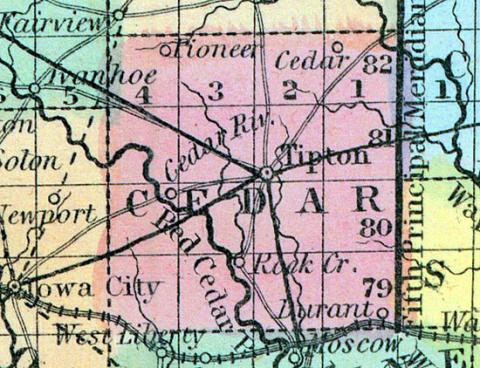TIPTON, a post-village, capital of Cedar county, Iowa, 25 miles E. N. E. from Iowa City. It is pleasantly situated on an undulating upland prairie, having groves of timber in the vicinity. Tipton is a place of active business, containing 6 stores, and 1 steam mill. Population in 1853, about 800. (Baldwin's New and Complete Gazetteer of the United States..., 1854)
TIPTON The town of Tipton was incorporated as the seat of justice of Cedar county by an Act of the Sixth General Assembly, approved January 27th, 1857.
The location is a very advantageous one, being upon a high and beautiful prairie, within one mile of a large body of timber, and enjoying the benefit of excellent water, thus offering inducements to a better class of settlers who, in seeking a home, wish to secure health and comfort, combined with a delightful location.
The town is situated in the geographical centre of the county, and was originally laid out on the north-west quarter of Section 6, Township 80, north of Range 2, west of the 5th P. M., but has since been enlarged by the addition of other tracts to the north and west, so that it now comprises over 300 acres.
The nearest point on the Mississippi River is Muscatine, 25 miles distant, nearly due south. The nearest shipping points, at the present time, are Wilton Junction, on the Mississippi and Missouri Railroad, some 16 miles south south-east from Tipton, and Clarence, a station on the Chicago, Iowa and Nebraska Railroad, about 12 miles north-east—but a branch railroad has been projected to run from Wilton Junction through the town of Tipton, thence due north, to connect with the Chicago Iowa and Nebraska Railroad, and form a portion of the proposed route from Dubuque to Keokuk. The road-bed from Wilton Junction to Tipton is now graded, and the speedy completion of the work is confidently anticipated. It may safely be asserted that when this is accomplished it will add greatly to the commercial facilities and prosperity of the town.
The first settlement of the place was early in the spring of 1840, and immediately after it was located as the county seat by Henry W. Higgins, of Scott county, J. G. McDonald, of Jackson, and John Eagan of Johnson, who were appointed by an Act of the Legislature of the Territory of Iowa, passed December 31st, 1839.
The site was determined on and the survey made on the 12th of March, 1840—the name of the town was given by one of the Commissioners, who was said to have been a connection of General Tipton of Indiana.
The first settlers were John P. Cook, William K. Whittelsey, John Culbertson, William Cummins, Charles M. Jennings, Daniel Davis, and Ninian Y. Walker, who were very soon afterward followed by Preston J. Friend, John R. McCurdy, William R. Rankin, Jacob A. Haight, Davison Lee, William H. Tuthill and others.
The first child born in the town was Jacob Tipton Haight, in the spring or summer of 1841, and the first death that occurred (adult,) was Mrs. Elizabeth Lett, on the 9th day of October, 1841.
A long and acrimonious contest by the rival town of Rochester with Tipton, for the county seat, retarded the settlement of the place for a number of years; but the vexed question being finally settled by the success of Tipton, it has since that time steadily and gradually increased in population and business in the same ratio with the progressive settlement and cultivation of the surrounding country, and now numbers a population of some 1,500.
The Public School buildings, although possessing no architectural attractions, are large and commodious, and as no means have been spared to obtain the best teachers, with all the modern appliances and educational facilities, the town has acquired an established reputation for good schools.
The private dwellings are mostly very neat and tasty in design, and would not discredit the taste of places of much higher pretensions; among them the residences of Judge Tuthill, and of John Culbertson, are the most conspicuous. With a comparatively small population, the town contains five churches, viz: Methodist, Congregational, Presbyterian, Lutheran and Episcopal. Two hotels, viz: the Aldrich House, Mrs. Elizabeth Beatty, proprietor, and the Union Hotel, kept by Mrs. Catharine Fleming. There are nine lawyers, and four physicians; eight general stores, three boot and shoe, three saddle and harness, three hardware stoves and tinware, three clothing, two drugs and medicines, and one watch and jewelry, two builders, two cabinet makers, two house and sign painters, and one dentist. There is also an excellent steam flouring mill within the limits of the town, erected at a cost of over $10,000.
The Court House, erected in 1860 at a cost of $45,000, is said to be one of the handsomest edifices of the kind in the State.
The Cedar County Agricultural Society has its office at this place, and holds an annual exhibition at its fair ground, contiguous to the town, which being well attended, has done good service to the cause of the farmers and producers.
The Cedar County Bible Society, organized in 1842, has its Depository here, and has discharged its duties in supplying the citizens of the county with bibles and testaments for the last 22 years. It is free from debt, and has a good selection of books in its Depository.
Cedar Lodge, No. 11, A. F. and A. M., hold their regular meetings in this place every Saturday evening, on or before the full moon.
Crystal Fount Lodge, No. 230, I. O. of G. T., is a flourishing organization with about 150 working members—meeting every Tuesday evening.
The Tipton Advertiser, a weekly newspaper, (Republican,) is published every Thursday, proprietors, Clark & Mulford; editor, S. S. Daniels. (Hair's Iowa State Gazetteer..., 1865)

